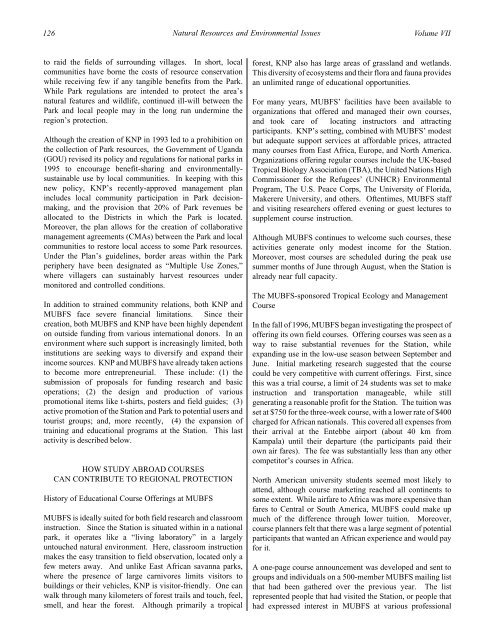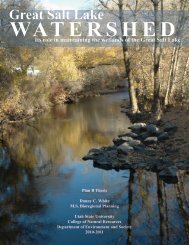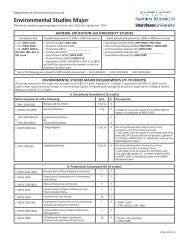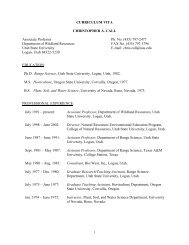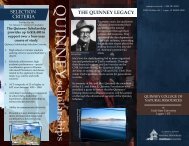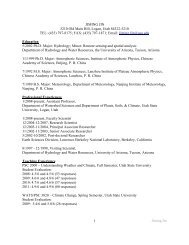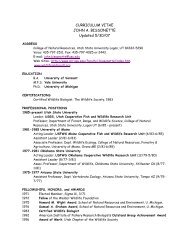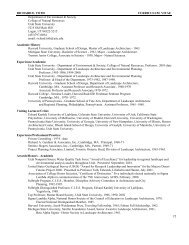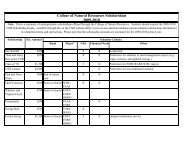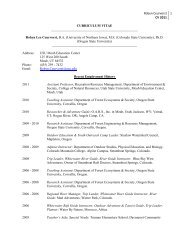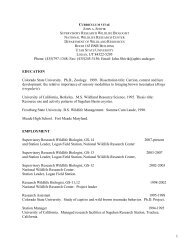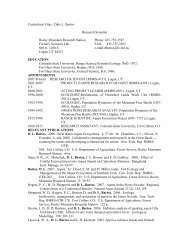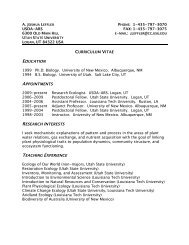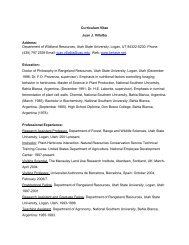University Education in Natural Resources - CNR Home - Utah State ...
University Education in Natural Resources - CNR Home - Utah State ...
University Education in Natural Resources - CNR Home - Utah State ...
You also want an ePaper? Increase the reach of your titles
YUMPU automatically turns print PDFs into web optimized ePapers that Google loves.
126 <strong>Natural</strong> <strong>Resources</strong> and Environmental Issues Volume VII<br />
to raid the fields of surround<strong>in</strong>g villages. In short, local<br />
communities have borne the costs of resource conservation<br />
while receiv<strong>in</strong>g few if any tangible benefits from the Park.<br />
While Park regulations are <strong>in</strong>tended to protect the area’s<br />
natural features and wildlife, cont<strong>in</strong>ued ill-will between the<br />
Park and local people may <strong>in</strong> the long run underm<strong>in</strong>e the<br />
region’s protection.<br />
Although the creation of KNP <strong>in</strong> 1993 led to a prohibition on<br />
the collection of Park resources, the Government of Uganda<br />
(GOU) revised its policy and regulations for national parks <strong>in</strong><br />
1995 to encourage benefit-shar<strong>in</strong>g and environmentallysusta<strong>in</strong>able<br />
use by local communities. In keep<strong>in</strong>g with this<br />
new policy, KNP’s recently-approved management plan<br />
<strong>in</strong>cludes local community participation <strong>in</strong> Park decisionmak<strong>in</strong>g,<br />
and the provision that 20% of Park revenues be<br />
allocated to the Districts <strong>in</strong> which the Park is located.<br />
Moreover, the plan allows for the creation of collaborative<br />
management agreements (CMAs) between the Park and local<br />
communities to restore local access to some Park resources.<br />
Under the Plan’s guidel<strong>in</strong>es, border areas with<strong>in</strong> the Park<br />
periphery have been designated as “Multiple Use Zones,”<br />
where villagers can susta<strong>in</strong>ably harvest resources under<br />
monitored and controlled conditions.<br />
In addition to stra<strong>in</strong>ed community relations, both KNP and<br />
MUBFS face severe f<strong>in</strong>ancial limitations. S<strong>in</strong>ce their<br />
creation, both MUBFS and KNP have been highly dependent<br />
on outside fund<strong>in</strong>g from various <strong>in</strong>ternational donors. In an<br />
environment where such support is <strong>in</strong>creas<strong>in</strong>gly limited, both<br />
<strong>in</strong>stitutions are seek<strong>in</strong>g ways to diversify and expand their<br />
<strong>in</strong>come sources. KNP and MUBFS have already taken actions<br />
to become more entrepreneurial. These <strong>in</strong>clude: (1) the<br />
submission of proposals for fund<strong>in</strong>g research and basic<br />
operations; (2) the design and production of various<br />
promotional items like t-shirts, posters and field guides; (3)<br />
active promotion of the Station and Park to potential users and<br />
tourist groups; and, more recently, (4) the expansion of<br />
tra<strong>in</strong><strong>in</strong>g and educational programs at the Station. This last<br />
activity is described below.<br />
HOW STUDY ABROAD COURSES<br />
CAN CONTRIBUTE TO REGIONAL PROTECTION<br />
History of <strong>Education</strong>al Course Offer<strong>in</strong>gs at MUBFS<br />
MUBFS is ideally suited for both field research and classroom<br />
<strong>in</strong>struction. S<strong>in</strong>ce the Station is situated with<strong>in</strong> <strong>in</strong> a national<br />
park, it operates like a “liv<strong>in</strong>g laboratory” <strong>in</strong> a largely<br />
untouched natural environment. Here, classroom <strong>in</strong>struction<br />
makes the easy transition to field observation, located only a<br />
few meters away. And unlike East African savanna parks,<br />
where the presence of large carnivores limits visitors to<br />
build<strong>in</strong>gs or their vehicles, KNP is visitor-friendly. One can<br />
walk through many kilometers of forest trails and touch, feel,<br />
smell, and hear the forest. Although primarily a tropical<br />
forest, KNP also has large areas of grassland and wetlands.<br />
This diversity of ecosystems and their flora and fauna provides<br />
an unlimited range of educational opportunities.<br />
For many years, MUBFS’ facilities have been available to<br />
organizations that offered and managed their own courses,<br />
and took care of locat<strong>in</strong>g <strong>in</strong>structors and attract<strong>in</strong>g<br />
participants. KNP’s sett<strong>in</strong>g, comb<strong>in</strong>ed with MUBFS’ modest<br />
but adequate support services at affordable prices, attracted<br />
many courses from East Africa, Europe, and North America.<br />
Organizations offer<strong>in</strong>g regular courses <strong>in</strong>clude the UK-based<br />
Tropical Biology Association (TBA), the United Nations High<br />
Commissioner for the Refugees’ (UNHCR) Environmental<br />
Program, The U.S. Peace Corps, The <strong>University</strong> of Florida,<br />
Makerere <strong>University</strong>, and others. Oftentimes, MUBFS staff<br />
and visit<strong>in</strong>g researchers offered even<strong>in</strong>g or guest lectures to<br />
supplement course <strong>in</strong>struction.<br />
Although MUBFS cont<strong>in</strong>ues to welcome such courses, these<br />
activities generate only modest <strong>in</strong>come for the Station.<br />
Moreover, most courses are scheduled dur<strong>in</strong>g the peak use<br />
summer months of June through August, when the Station is<br />
already near full capacity.<br />
The MUBFS-sponsored Tropical Ecology and Management<br />
Course<br />
In the fall of 1996, MUBFS began <strong>in</strong>vestigat<strong>in</strong>g the prospect of<br />
offer<strong>in</strong>g its own field courses. Offer<strong>in</strong>g courses was seen as a<br />
way to raise substantial revenues for the Station, while<br />
expand<strong>in</strong>g use <strong>in</strong> the low-use season between September and<br />
June. Initial market<strong>in</strong>g research suggested that the course<br />
could be very competitive with current offer<strong>in</strong>gs. First, s<strong>in</strong>ce<br />
this was a trial course, a limit of 24 students was set to make<br />
<strong>in</strong>struction and transportation manageable, while still<br />
generat<strong>in</strong>g a reasonable profit for the Station. The tuition was<br />
set at $750 for the three-week course, with a lower rate of $400<br />
charged for African nationals. This covered all expenses from<br />
their arrival at the Entebbe airport (about 40 km from<br />
Kampala) until their departure (the participants paid their<br />
own air fares). The fee was substantially less than any other<br />
competitor’s courses <strong>in</strong> Africa.<br />
North American university students seemed most likely to<br />
attend, although course market<strong>in</strong>g reached all cont<strong>in</strong>ents to<br />
some extent. While airfare to Africa was more expensive than<br />
fares to Central or South America, MUBFS could make up<br />
much of the difference through lower tuition. Moreover,<br />
course planners felt that there was a large segment of potential<br />
participants that wanted an African experience and would pay<br />
for it.<br />
A one-page course announcement was developed and sent to<br />
groups and <strong>in</strong>dividuals on a 500-member MUBFS mail<strong>in</strong>g list<br />
that had been gathered over the previous year. The list<br />
represented people that had visited the Station, or people that<br />
had expressed <strong>in</strong>terest <strong>in</strong> MUBFS at various professional


